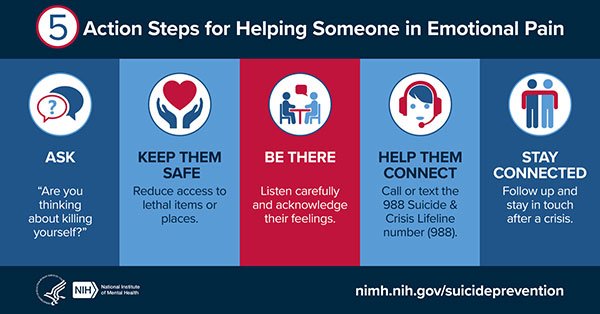Straight Talk on Mental Health
Psalm 69:2-3 I have sunk in deep mire, and there is no foothold; I have come into deep waters, and a flood overflows me. I am weary with my crying; my throat is parched; My eyes fail while I wait for my God.
Our Brazos Valley community suffered at least three suicides this last week (those are just the ones reported). One would be too many, but three in a week is a tragedy and a wake up call that we need to talk much more frequently and openly about mental health. So let me go first. I have suffered from clinical depression for the last six years. SSRI medication, counseling, and a career change have all helped manage my condition, but this burden doesn’t go quietly into the night. It lingers, always ready to reassert itself if I don’t continually pursue community and medical help. Sadly, when I first fell into depression I felt ashamed because I had grown up believing the lie that strong men and faithful Christians don’t get depressed. After all, didn’t we grow up singing,
I've got the joy, joy, joy, joy down in my heart
Where? Down in my heart! Where? Down in my heart!
I've got the joy, joy, joy, joy down in my heart
Down in my heart to stay
And I'm so happy, So very happy…
Fortunately, God has used wise counselors and friends to refute that lie in my life, and I wish to do the same for you. Yes, the Holy Spirit can give joy to Christians who follow Jesus. But David’s words in Psalm 69 above prove that even faithful Christians can suffer with clinical depression and anxiety. Solomon, Isaiah, John the Baptist, and many other men and women of scripture suffered the same. Depression, anxiety, bi-polarity, suicidal ideation… none of these are a mark of shame. They are a result of humanity’s brokenness. As our bodies are frail and vulnerable, so are our minds. We would not berate a person diagnosed with Parkinson’s disease. So why do we berate a person suffering from a mental health disorder?
So let’s get practical. What can we do if we’re struggling with depression, anxiety, suicidal ideation, or another mental health challenge, or if we know someone who is?
Give grace. This struggle is not proof of failure, spiritual immaturity, or guilt. While some suffer because they’ve made destructive choices (e.g. abuse of alcohol or drugs), many suffer through no fault of their own just like so many of the faithful suffered in the Bible through no fault of their own.
Get professional help. Thank God for wise counselors and therapists! We would be fools not to take advantage of their expertise (see Proverbs 11:14). Please reach out to your health care provider to find a local counselor or therapist who can help you or your loved one. If you don’t have insurance, MHMR can provide free help during their Open Access days Monday, Wednesday, and Friday from 8:30am-11:30am, first come first serve. And if you are ever in a crisis moment, call or text the National Suicide Prevention Lifeline at 988.
Confide in a community. Anxiety and depression grow in the dark. Bring them into the light with a trusted friend, mentor, family member, or church leader. We need to be honest, open, and vulnerable with one another or we’ll never get better (see Ecclesiastes 4:9-10).
Take care of your body. Our minds, bodies, and spirits are inseparably united so that what hurts one part of us hurts all parts of us. In most cases, mental health struggles are linked to physiological ailments in our bodies. In my case, I needed an SSRI medication to stabilize my brain’s biochemistry. Others need anti-anxiety medications, anti-psychotics, or treatments for an underlying disease, or even just changes to their diet, exercise or sleep routines. Schedule an appointment with your doctor as soon as possible to identify potential medical issues.
Learn. There are many great books about mental health, spiritual health, healing, and recovery. Three of the best in my own life have been “The Anxiety and Phobia Workbook” by Bourne, “Walking on Water When You Feel Like You're Drowning” by Nelson and Leavitt, and “Choose and Choose Again” by Kevin Butcher. The latter is not specifically about mental health, but more about God’s outrageous love for all of us who are struggling.

